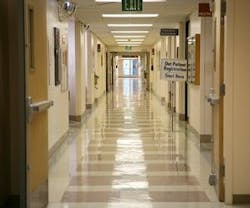Economy Forces Most Wired Hospitals to Look Closely at IT Spending
NewsRx.com
July 16, 2009
The economic crisis is forcing many hospitals to make tough decisions with scarce resources, including delaying and scaling down information technology (IT) projects, according to a newly released survey of America's "most wired" hospitals and health systems. While progress has been made and incentives to implement IT will be available through the recently passed stimulus legislation, many hospitals still have a long way to go (see also American Hospital Association).
The 100 Most Wired hospitals are torn between building on their IT successes and keeping a sharp eye on budgets. Marking its 11th year, the Most Wired Survey and Benchmarking Study continues to lead the field in analyses and benchmarking of healthcare IT.
"The economic slowdown is forcing hospitals to look closely at IT spending," says Alden Solovy, executive editor of Hospitals & Health Networks magazine. "Most Wired hospitals are doing their best to stay the course."
To complicate matters, the great unknown of health care reform looms in the near future and a number of regulatory changes are already heading down the pike, including the shift to ICD-10.
"As the health reform debate continues, it's clear that IT will play an even more important role in the health system of tomorrow," says Rich Umbdenstock, president and CEO of the American Hospital Association (AHA). "Most Wired hospitals help illustrate IT in action—improving efficiency, quality and safety of care while helping to control costs."
Hospitals also continue to invest in IT that supports quality and safety initiatives. Investment in electronic medication management is considered one of the fundamentals of using IT to improve care. The 2009 Most Wired Survey and Benchmarking Study shows an overall increase in both provider order entry of medications and electronic bedside matching at the time medications are administered.
"Hospitals clearly recognize that in spite of smaller budgets they still need to invest in IT and position themselves for the future," says Sunny Sanyal, president of McKesson Provider Technologies. "We're seeing hospitals reprioritize. For example, instead of continuing with plans to build a new data center extension, a hospital now may choose to redirect funds to other technologies."
Of the organizations completing the survey this year, 38 hospitals and health systems--6.8 percent of the sample—have effectively deployed information technology at both ends of the medication administration process. This compares with 23 hospitals and health systems in 2008, or 4.1 percent of the sample.
At the typical hospital responding to the survey, 26 percent of medications are entered electronically by physicians, compared with 19 percent in 2008. The typical respondent has 40 percent of medications matched at the bedside, compared with 30 percent in 2008.
The Most Wired Survey is conducted annually by Hospitals & Health Networks magazine, the journal of the AHA, which uses the results to name the 100 Most Wired hospitals and health systems. It focuses on how the nation's hospitals use information technologies for quality, customer service, public health and safety, business processes and workforce issues.
Hospitals & Health Networks conducted the 2009 survey in cooperation with McKesson Corp. and the College of Healthcare Information Management Executives. The July H & HN cover story detailing results is available at www.hhnmag.com.
Keywords: American Hospital Association.
This article was prepared by Hospital Business Week editors from staff and other reports. Copyright 2009, Hospital Business Week via NewsRx.com.
To see more of the NewsRx.com, or to subscribe, go to http://www.newsrx.com.
2007 NewsRx.com. All Rights Reserved. Copyright 2009, Hospital Business Week via NewsRx.com
